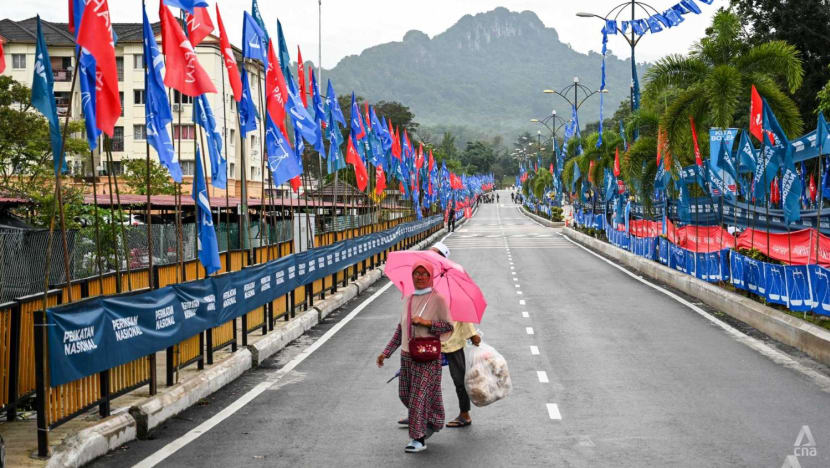Malaysia GE15: Will success or failure handling COVID-19 determine who wins at the ballot box?
Opposition figures have attacked some politicians for their ineffectiveness in dealing with the pandemic and resulting economic woes.

SINGAPORE: The success – or failure – of Malaysian leaders in handling the COVID-19 pandemic may well determine their fate at the ballot box come the Nov 19 general election, analysts say.
Some politicians have touted their achievements in managing the unprecedented health crisis as a reason to vote for them.
Others have been attacked by opposition figures for ineffectively dealing with the pandemic and its resulting economic woes.
Dr Lee Hwok Aun, co-coordinator of the Malaysia Studies Programme at the ISEAS-Yusof Ishak Institute, told CNA that whether COVID-19 will be a voting issue will depend on how the electorate perceives its impact on their current living conditions.
Malaysia's 15th general election is expected to be a closely fought contest, with three main coalitions – Barisan Nasional (BN), Pakatan Harapan (PH) and Perikatan Nasional (PN) – looking to take the biggest share of federal seats and form the next government.
How some leaders have handled the coronavirus outbreak has been a hot topic during campaign rounds, and drawn mixed reactions over their performance.
Political analyst Amir Fareed of public affairs and political risk consultancy KRA Group pointed to caretaker Prime Minister Ismail Sabri Yaakob, former prime minister Muhyiddin Yassin and Health Minister Khairy Jamaluddin as "figures who have been at the forefront of the pandemic”.
COVID-19 AS ELECTION ISSUE
Malaysia has recorded nearly 5 million confirmed COVID-19 cases since the pandemic began in 2020, and is heading to the Nov 19 polls amid a new wave driven by the Omicron XBB sub-variant.
The ruling BN coalition, as well as the PN alliance led by Mr Muhyiddin, have been highlighting achievements in their COVID-19 response, especially the “quite substantial” Prihatin economic relief packages, said Dr Lee.
“Clearly, they think that it was well received, and something that could actually help their cause.”
Mr Muhyiddin believes that his management of the health crisis will help him win votes.
But opposition leader Anwar Ibrahim of the PH coalition has accused the former prime minister of failing to control the pandemic, resulting in a high number of deaths in Malaysia.
Prolonged COVID-19 lockdowns can also be blamed for a rise in unemployment and poverty, said Mr Anwar.
Malaysians are facing high costs of living, higher inflation and stagnant real wages, said Dr Lee.
“These conditions generally would favour the opposition, and you see Pakatan Harapan is sort of hammering on that front and blaming the government for the current economic woes.”
But some Malaysians may look back and feel that things have since improved, he added.
“There was definitely widespread discontent, and some things were inadequate, but Malaysia did extend a lot of assistance in wage subsidies and loan embargoes, and also the vaccination programmes.
“So, it really can work in various ways, to the advantage or disadvantage of the different parties, depending on how they play it.”
Mr Amir, the analyst, agreed that “rivals are trying to attack one another with regard to COVID-19 handling”.
Yet experts believe many Malaysians who struggled during the pandemic just want to move forward.
Mr Amir said: “At the end of the day, the real issue that the voters are concerned with is the economy and how to move forward.”
SHRINKING MIDDLE CLASS, STRUGGLING BUSINESSES
The impact of the COVID-19 pandemic, coupled with inflationary pressures, has made Malaysia’s recovery momentum “very slow”, said Mr Amir.
The economy expanded 6.9 per cent in the first half of the year and is expected to grow stronger. Unemployment rates have also dropped, from a high of 5.3 per cent in May 2020 to 3.6 per cent in September this year.
But the burden of the pandemic still lingers, with Malaysia facing a shrinking middle class and a growing vulnerable segment.
“There are reports out there by think-tanks and research centres which put that at least 70 per cent of Malaysians are now in the vulnerable group post-pandemic,” said Mr Amir.
“We're also seeing signs of struggles by small businesses. This is all in spite of the assistance packages that the government has provided since March 2020.”
"ALL SORTS OF POLITICAL SHENANIGANS"
In the wake of the pandemic, Malaysia now faces a fragmented political landscape.
“It's been a period of political instability and parliament has seen these crossovers, all sorts of political shenanigans and changing loyalty,” said Dr Lee.
“I think that goes to the heart of the problem - not just about structures, but I think also about the behaviour of the political class.”
Widespread discontent over politicians jumping from one party to another has led to an anti-party hopping law, which will address blatant forms of defection.
But political behaviour is not something that can be regulated by law, said Dr Lee.
“I think the best hope is that the voters will send a very strong message about the kinds of character, the principles and values that they would like to see in their elected leaders."
















